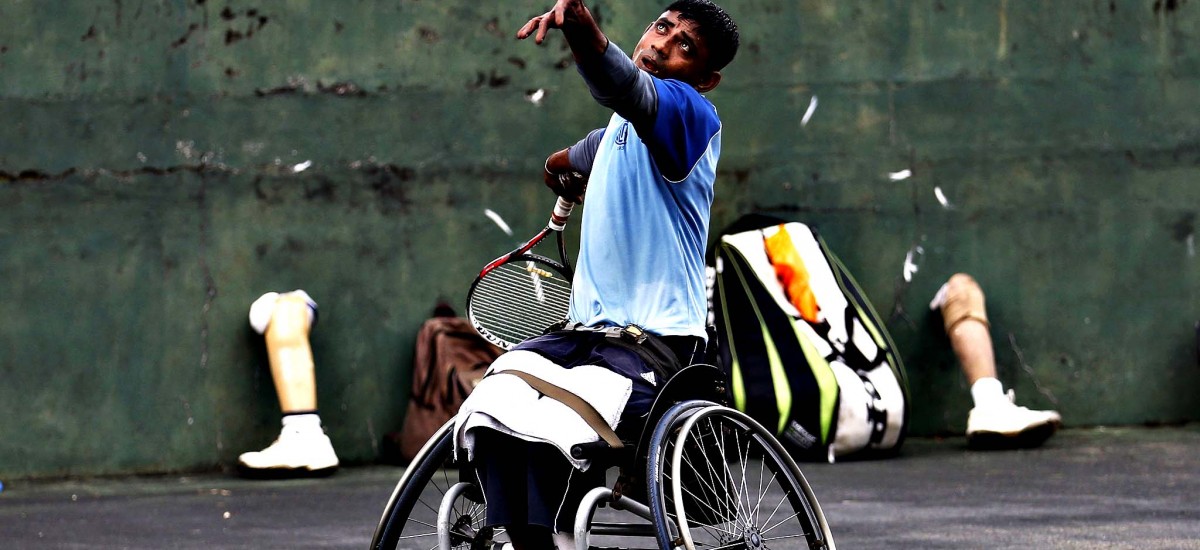Photo by REUTERS/Dinuka Liyanawatte, via FT
Although a signatory to the UN Convention on the Rights of Persons with Disabilities since 2007, the rights of people with disabilities in Sri Lanka has remained at a dismal state over the past several decades. A recent manifestation of this issue has occurred at my Alma Mater, Visakha Vidyalaya, Colombo, where a mother of a student was forced to file a complain with the Human Rights Commission to obtain adequate accommodations for her differently-abled daughter (a Grade 8 student of the school). The complainant alleged that the principal of Visakha Vidyalaya, Ms. Sandamali Aviruppola, rejected repeated requests for a ground floor classroom for her disabled daughter. Incidents like this—calling to question our collective commitment to ensuring basic human rights—often go unnoticed, or get pushed aside as ‘unimportant,’ amidst the larger sociopolitical turmoil within the country.
The recent incident at Visakha Vidyalaya is problematic in a number of ways. The school authority’s initial dismissal of the request for adequate accommodation for the student violates the student’s basic rights as stated in the 1996 Act for the Protection of the Rights of Persons with Disabilities in Sri Lanka. It also violates a 2009 Supreme Court ruling that requires all authorities to ensure building plans are in compliance with the provisions stated in the 1996 Act.
Furthermore, the school authority’s refusal to allow the student’s father to carry her to the classroom, based on the assertion that “it is not suitable for the father to come carrying a daughter [to a classroom] because grade 8 students are young adults” is dumbfounding. This argument denotes nothing more than baseless and stereotypical ideologies about traditional gender-roles, e.g., men [in this case, fathers] cannot be nurturing/ caretakers, nor can they be trusted in female-dominated public spaces.
The media coverage of this incident also highlights an important issue. Nowhere in online media reporting about this incident was I able to find basic information such as the name of the student in question. [Perhaps this information was mentioned in local print media, to which I do not have access to at the moment.] In a national TV broadcast covering the story, the student was repeatedly referred to as “she” and “her.” Additionally, the opinions and experiences of the student were completely overlooked by only presenting interviews with the mother and the school principal, while repeatedly showcasing images of the student. In other words, popular media coverage denied her a voice—the one voice that would have been the most meaningful and powerful in this particular case.
Even presumably progressive media outlets failed to make a case for this student, with the respect and dignity that she deserves. The belittling of her identify as a person relates to the larger issue of our inability to not only protect the rights of differently-abled people, but also to distinguish between physical and cognitive impairments. A blind, deaf, or otherwise disabled person is automatically categorized as the “other.” Our perceptions towards such people change so much so that we often fail to acknowledge them and their lived experiences. In extreme cases, they are denied opportunities to develop their physical and cognitive abilities, and their voices and opinions go unheard.
In a country where over 16% of the population is disabled, needless to say that much more needs to be done in order to protect the rights of differently-abled people. Largely defunct policy frameworks do little to ensure the wellbeing of the disabled community in Sri Lanka. The attitudes and perceptions of the larger society need to adapt in ways that not only acknowledge, but also embrace and celebrate human diversity. Even from a purely utilitarian perspective, providing access and inclusion to people with disabilities can increase diversity of perspectives and demonstrate our collective social responsibility.
In education, inclusion of people with disabilities and providing them adequate access and accommodation will not only make them productive citizens, but also enhance the wellbeing of the overall society. The refusal of publicly funded schools in Sri Lanka to admit students with certain forms of disabilities not only deprive those students of valuable opportunities, but also deprive ‘able-bodied’ students of the opportunity to understand and embrace diversity.
This issue is deeply personal to me as someone living with and struggling with Scoliosis (i.e., a lateral curvature in the normally straight vertical line of the spine). I was fortunate to grow up in a family that had the social and cultural capital to provide me with not only quality healthcare, but also access to a “normal” education. Today, “I stand upon the shoulders of giants” such as my family and my teachers (some of them from Visakha Vidyalaya) who relentlessly stood by me and fought for my access and inclusion.
As someone who navigates the rather fluid boundary between an “abled” and “disabled” body in her daily life, I can relate to the struggles of my fellow Visakhain, to some extent. For her, me, and many other differently-abled people in Sri Lanka, my hope is that we not only fight for stricter policy implementations for enabling access and inclusion, but that we commit to changing our collective mindset through honest and open discussions about these critical issues.

